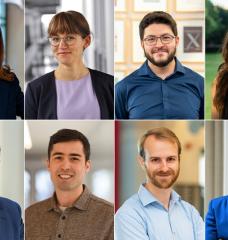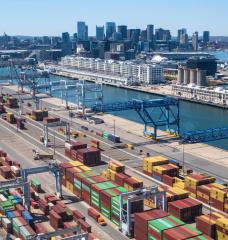Description
In this bonus episode, the Climate Conversations team asks, should we reduce how frequently we fly?
If you’re enjoying our Climate Conversations podcast, you can subscribe on your favorite podcast platform to hear the latest episodes first. Find us on:
Transcript
[00:00:00:00] RAJESH KASTURIRANGAN: Welcome to Climate Conversations, the podcast from MIT's ClimateX, the global community for climate action.
[00:00:05:28]
[00:00:10:02] So I'm Rajesh Kasturirangan, and I'm here with two of my fellow hardliners--
[00:00:15:17] DAVE DAMM-LUHR: Dave Damm-Luhr--
[00:00:16:23] CURT NEWTON: And Curt Newton--
[00:00:17:21] DAVE DAMM-LUHR: But wait a minute. Hardliners?
[00:00:19:19] RAJESH KASTURIRANGAN: Yes.
[00:00:20:07] DAVE DAMM-LUHR: Nobody's ever called me that.
[00:00:21:21] CURT NEWTON: Well, wait until you hear what they call you.
[00:00:27:12] RAJESH KASTURIRANGAN: OK, flying.
[00:00:28:20] DAVE DAMM-LUHR: So what's on my mind and heart is do I really have to stop traveling by air because I understand that it's a big source of greenhouse gas emissions.
[00:00:39:22] RAJESH KASTURIRANGAN: You mean without growing your own wings?
[00:00:41:26] DAVE DAMM-LUHR: Right, and I love to travel to exotic faraway places, so that's a real pickle for me.
[00:00:50:23] RAJESH KASTURIRANGAN: And?
[00:00:51:14] DAVE DAMM-LUHR: And I'm trying to find a way to rationalize it.
[00:00:55:15] [LAUGHS]
[00:00:57:11] CURT NEWTON: How's that going, man?
[00:00:58:15] DAVE DAMM-LUHR: Oh, no, so I read George Marshall. I don't know if you ever come across him--
[00:01:02:22] RAJESH KASTURIRANGAN: Tell us about George Marshall.
[00:01:03:22] DAVE DAMM-LUHR: But he's really-- he's a behavioral economist and does some other things with psychology, and he was reporting on a big conference of climate scientists and other folks around the world. And he was talking with some of them after this conference and said, oh, yeah. How was that trip to Sierra Leone? And what about that? Oh, yeah, and that skiing trip that you had to some exotic location in the Swiss Alps and-- all the people were very aware of climate change and the effects of flying and greenhouse gas emissions, and they all had rationalizations for why it was OK for them, not for others but for them, to travel by air to far away places.
[00:01:42:19] CURT NEWTON: Yeah, that's the case for so many of these individual action questions right? It's all too easy in cases to rationalize the things we want to do.
[00:01:50:28] RAJESH KASTURIRANGAN: With flying, there might be a collective element, too, right? Like a conference, are you-- is it OK to fly to a climate change conference?
[00:01:59:11] CURT NEWTON: Yeah, well, that's a real interesting question, and I'll do a hat tip out to our Warm Regards podcast, the episode with Katharine Hayhoe about a year or two ago, they talked about that very thing.
[00:02:11:07] DAVE DAMM-LUHR: Oh, with Andy Revkin?
[00:02:12:26] CURT NEWTON: Yeah, this was Eric Holthaus and Andy Revkin and Jacqueline Gill. And they talked about that very question, and it's worth checking out their response.
[00:02:20:19] RAJESH KASTURIRANGAN: I frankly think that certain communities, especially left wing-y, academic-y communities that nevertheless fly a lot should be one of the first communities to decarbonize in this fashion.
[00:02:36:21] CURT NEWTON: No kidding. Yeah, let's push the envelope on use of video conferencing and other ways to gather and work collectively on things. I mean I love get together with people, but here you look at studies that rack up the sorts of things that contribute to our personal footprints. And taking long flights, is really-- it's pretty devastating.
[00:02:54:25] RAJESH KASTURIRANGAN: And conferences suck.
[00:02:56:17] DAVE DAMM-LUHR: So if we've got relatives in faraway places, should we not visit them? Should they not visit us? As you're saying we should only do video conferences with our faraway relatives?
[00:03:06:03] CURT NEWTON: I would never be so black and white about things, but maybe there are ways to think about more consolidated gatherings instead of pairwise meetups, big family reunions some place centrally located, for instance. How about something like that? How does that sound?
[00:03:23:00] RAJESH KASTURIRANGAN: I don't mind it. Maybe we should just designate some spots in the world that are just family gathering convention centers where you just go and 50 of your--
[00:03:34:04] DAVE DAMM-LUHR: You've got family in India and in South Asia. You're not going to stop visiting them.
[00:03:38:24] RAJESH KASTURIRANGAN: I won't, but I could just move to South Asia. There's that.
[00:03:43:17] DAVE DAMM-LUHR: It's a possible solution.
[00:03:44:23] CURT NEWTON: Yeah, I mean we're here at MIT with a lot of researchers who are engaged in the world, and they need to travel fairly often to those places out in the field to do their research to be connected. I wonder how they play it.
[00:03:59:21] RAJESH KASTURIRANGAN: Yes, but I think that it's the people with the most power and authority who need to make the first sacrifice. And so I would make an MIT faculty person not fly before I make a University of Zambia person not fly.
[00:04:18:10] CURT NEWTON: Totally fair.
[00:04:19:04] DAVE DAMM-LUHR: Well, hold it. This is MIT. Let me play devil's advocate here. There are a lot of technology solutions that are readily available. So why don't we put our research money into those?
[00:04:28:00] CURT NEWTON: Such as?
[00:04:28:22] RAJESH KASTURIRANGAN: Holograms.
[00:04:29:26] DAVE DAMM-LUHR: No. So fuel efficiencies, new fuels, new aerodynamic designs. I even came across one in the Drawdown book that came from MIT-- it's nicknamed the double bubble-- to reduce both fuel and pollution by 70%. At least that's the promise. So why shouldn't we be putting our money in that. We can travel as much as we want if we can reduce the emissions by 70, 80%.
[00:04:53:07] CURT NEWTON: So that's all like 30, 40 plus years out right?
[00:04:57:08] DAVE DAMM-LUHR: Well, I don't know. I'm not sure-- that's another-- we ought to look into that in terms of when are those things going to be widely available so--
[00:05:03:04] CURT NEWTON: It's an either-- maybe it's a both-and situation where we've got to make decisions for how we live next year, 10, 20 years.
[00:05:10:12] RAJESH KASTURIRANGAN: I might be hardline. I feel like unless people with privilege aren't willing to consume a lot less of everything, they have absolutely no right writing papers about the topic.
[00:05:23:03] [SNAPPING]
[00:05:25:16] CURT NEWTON: Yeah, I think that's a running theme throughout a whole lot of our conversations here on ClimateX about the role of technology versus behavior choice and the pernicious impact of privilege in that. Thank you, Rajesh, for drawing the hard line.
[00:05:42:12] DAVE DAMM-LUHR: Well, there are a lot of things we can do, though. I've come across a couple of websites that tell you what you can do to help. One of the things is to not fly at night because it turns out the air pollution, the greenhouse gas emissions are much worse at night.
[00:05:59:08] CURT NEWTON: There's a solar effect on the-- interesting. Didn't know that.
[00:06:02:13] DAVE DAMM-LUHR: You can also buy carbon offsets. How about that? Those are all available. They've been-- many of them, not all of them, but some of them have been vetted, and they really do go towards carbon sequestration.
[00:06:13:23] CURT NEWTON: Shall we say, if you have to fly and you have rationalized it, that's a great thing to do.
[00:06:19:15] DAVE DAMM-LUHR: Umm hmm.
[00:06:20:22] RAJESH KASTURIRANGAN: [MAKING STATIC NOISE] That's me drawing the hard line.
[00:06:26:04] CURT NEWTON: Are we allowed to fly to the COP 23 Conference?
[00:06:28:27] RAJESH KASTURIRANGAN: Maybe it should be a virtual conference.
[00:06:31:05] CURT NEWTON: Good point.
[00:06:33:12] RAJESH KASTURIRANGAN: There you go.
[00:06:34:11] CURT NEWTON: Dave, back to your list.
[00:06:35:25] DAVE DAMM-LUHR: Right, so what's necessary for one person is a luxury for somebody else. How do you do that? You can't create regulations for individuals. You've got to do it by industry. So I think we should all be talking to our politicians demanding that federal government, state government, whatever governments are relevant start encouraging the airline industry to be a lot more fuel efficient and to get a lot more people into those planes because those load factors really make a big difference. If it's all first class, it's still three to five times more harmful for the greenhouse gases.
[00:07:13:02] RAJESH KASTURIRANGAN: So what you're saying is that the airlines are being benevolent by squeezing us into smaller and smaller seats.
[00:07:19:17] DAVE DAMM-LUHR: Right, they're doing their part. On a per passenger basis, yes, business class is a lot worse than economy, and first class is a hell of a lot more negative than any of the other two.
[00:07:32:16] RAJESH KASTURIRANGAN: Well, we could go on and on about this, but thank you for listening. Whether you have a hard or a soft or a medium line, we want to hear from you. So write to us at ClimateX_feedback@MIT.edu or contact us on Twitter @ClimateX_MIT or on Facebook.
[00:07:53:05] DAVE DAMM-LUHR: Or comment. Leave a comment below this podcast.
[00:07:56:10] RAJESH KASTURIRANGAN: We'd love to hear from you.
[00:07:58:06] CURT NEWTON: Thank you.
[00:07:59:06] DAVE DAMM-LUHR: Thanks a lot.
[00:08:01:09] RAJESH KASTURIRANGAN: Thank you for listening to Climate Conversations. You can find us wherever podcasts are cast, and we deeply, deeply appreciate your comments on Apple Podcasts if you have the time and the desire to do so.
[00:08:15:02]




